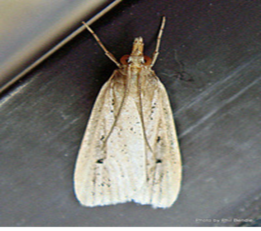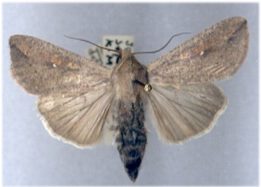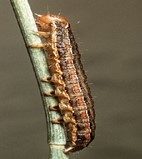Sod Webworm caterpillar stage
Sod Webworm moth stage
The Sod Webworm and Army Worm is the caterpillar stage of the common lawn moth. The night flying moth drops eggs from which the caterpillars hatch in the lawn and begin to feed on the grass almost immediately. Damaged areas have yellow patches of turf that may eventually turn brown and die.
Webworms and Armyworms are only active at night chewing grass, leaves often severing the entire plant at the crown. During the day Sod Webworms retreat to silk-lined tunnels in the thatch or soil. Birds flocking to your lawn to feed may indicate Sod Webworm activity. Webworms and Army Worms have multiple generations per year that cause damage from April through October. They can overwinter in warmer climates.
Army worm moth stage
Army worm caterpillar stage
The armyworm is the most common cause of damaged turf grass on golf courses, athletic fields, and home landscapes. The larval stage of armyworms can cause rapid, significant loss of leaf tissue in turf grass. They feed primarily on St. Augustine grass and zoysia grass, but can also be pests of other grass types. The name ‘armyworm’ originates from agriculture, where infestations sometimes resemble an army as they move across large agriculture fields. The same behavior can sometimes occur in turf, where areas as large as a football field can be consumed in the course
of 2-3 days.
Things to consider when diagnosing if you have Sod Webworm/Armyworms:
- Sod Webworms typically like St. Augustine grass
- Armyworms typically target Bermuda and Zoysia grasses.
- Both of these insects do not winter here. They migrate from Florida up the east coast usually and become a problem from July 1st thru October
- Both of these worms mault into moths. A key indicator that you have these worms would be if you see numerous moths on your lawn or plants.
If you suspect your lawn is under attack, please give us a call. We’ll check your lawn and let you know if there is a problem. If Sod Webworms or Army Worms are present, we can recommend the proper controls to protect your lawn. Contact us at 843-873-5711 to learn more.




